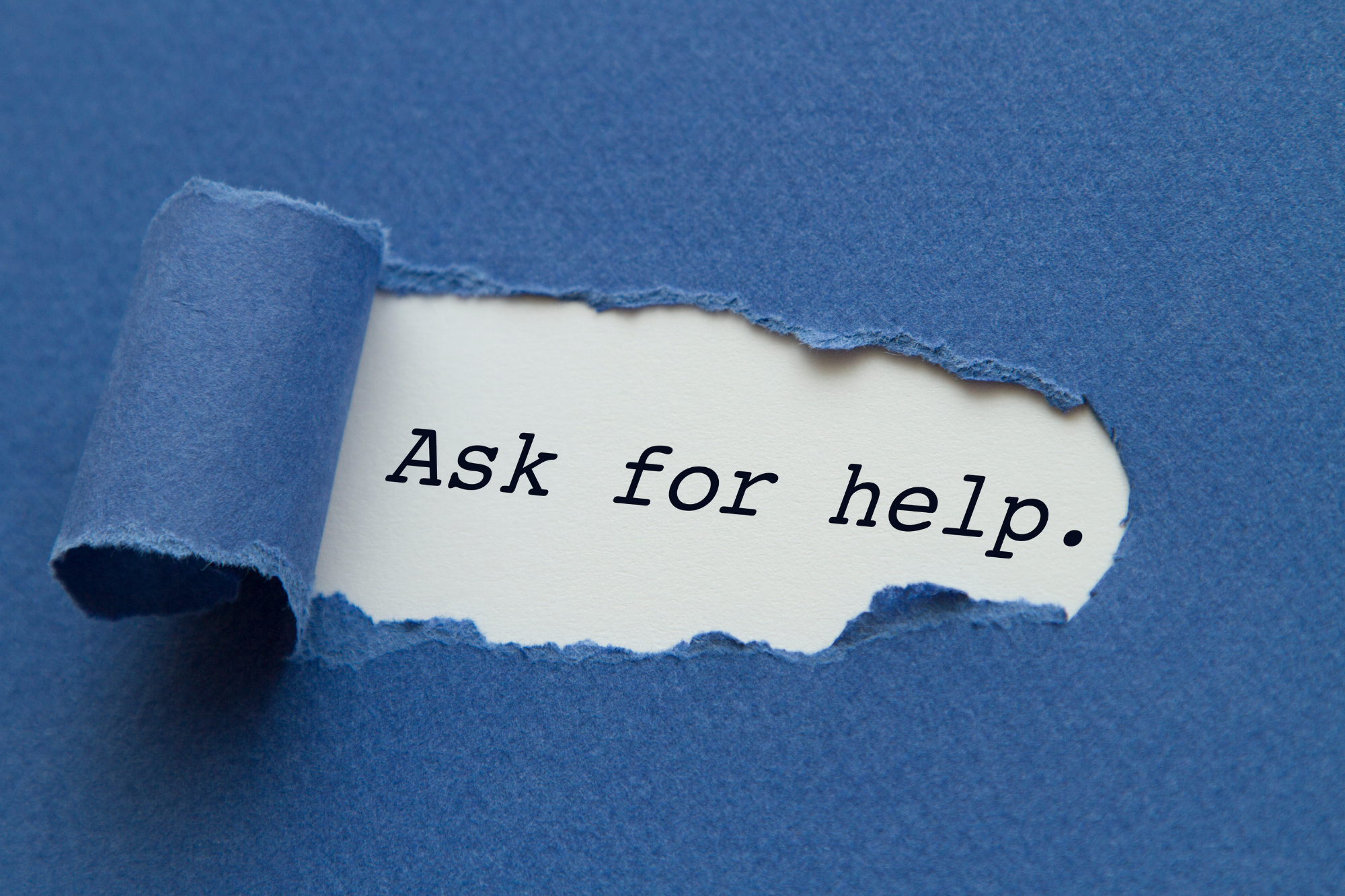The Importance Of Asking For Help, Even If It Feels Really Hard

The Importance Of Asking For Help, Even If It Feels Really Hard
Have you ever walked around a store looking for a particular item and found yourself lost but hesitant to ask an employee for guidance? For several reasons, it can feel quite difficult to ask for help. This can be true with the simplest of tasks but can be magnified in the context of mental health.
There are many people who become stuck in a cycle of psychological and emotional suffering and do not seek help. Unfortunately, becoming unstuck is not something that typically just happens without any intervention. For many people, asking for help can feel like a demonstration of weakness. We live in an individualistic culture founded on principles of self-reliance and prioritizing self-sufficiency over mutual support. For those conditioned to be more independent, it can feel edgy and uncomfortable to look outside of oneself for guidance or support. Being a team player or relying on others can feel really unnatural.
Why do we have a hard time asking for support when it comes to our mental health?
Here are 7 Emotional Reasons Why We Might Allow Ourselves to Continue to Suffer in Silence:
1. Denial
According to some theorists, denial is the first way people learn how to avoid discomfort. It is a powerful mechanism that protects us from feeling things we aren’t ready to feel, mainly fear and shame. Sometimes this is useful. In early life, for example, it might be helpful to deny having broken the rules or even to deny feeling sad out of fear of punishment from an angry or dismissive parent.
2. The Need to Be Independent
When we have historically prioritized self-reliance and self-sufficiency, asking for help feels uncomfortable because we are admitting that we may not have all the answers and may not have it all together. We might believe that we should be capable of handling everything solo. Programmed to play Lone Ranger, we may struggle in situations where teamwork is emphasized. Collaboration might be threatening to our independent self-image.
3. The Fear of Being Vulnerable
For those struggling with unworthiness or a sense of brokenness, asking for help can feel very scary. Feeling emotionally and psychologically exposed can be terrifying because what happens next is so uncertain.
4. The Fear of Losing Control
Within a relationship, when we ask for help, we expose our vulnerability and could be subject to the other person’s control. We might be worried about giving someone else the upper hand. In essence, our fear may be that our vulnerability could be exploited for their own gain, and we could end up feeling more hurt and alone. Consequently, we would rather carry the burden of our problems alone.
5. The Fear of Rejection
In thinking about seeking mental health services, the idea of being told that we can’t be helped by a particular professional might feel devastating. We might hear implicitly that “we are too broken” or “we are too much.” For those who associate rejection with an attack on their self-worth (which is nearly everyone), that’s a big obstacle. In reality, there could be many reasons why a person being asked for help wouldn’t be available, none of which has to do with us.
6. Over-Empathizing With Others
Some people are so attuned to the emotions of others that they anticipate reactions, such as feeling burdened, that might not materialize. They won’t request help because they don’t want to be seen as entitled, selfish, or bothersome. They feel they must win love by caring for and protecting others while hiding or ignoring their needs.
7. A Sense of Victimhood
People who go through life thinking, “I don’t deserve to be helped; I’m not worthy,” rarely seek support. Constantly hearing this inner voice, they believe it’s their fate to sacrifice or their burden to bear and struggle on their own.
If we are caught up in these behaviors, we likely have issues with low self-esteem and/or struggle to provide ourselves with self-compassion. We might be highly self-critical and often don’t believe we’ve earned the privilege of asking for others’ time and energy. Sometimes, we might not even understand what we really need or how others can help. Adverse childhood experiences like psychological and emotional neglect and abuse may have contributed to this reluctance to seek help. People who have endured abuse often try to be invisible by making very few demands.

The Many Benefits of Asking For Help
Taking A Load Off Our Shoulders
Living in a constant state of isolation and reliance on oneself stems from a place of fear and insecurity. It is also terribly exhausting to try to carry the weight of the world on our shoulders, feeling like we have to do it alone. When we reach out for help, a great load is lifted, leading to progress and reaching our full potential.
Asking for help is, in essence, fighting against cultural norms such as self-reliance and self-sufficiency, and therefore, it is a profound demonstration of a person’s inner strength. Framed in this way, asking for help isn’t the easy way out; it requires courage, humility, and self-awareness—traits that are admirable and also aspirational in this culture.
While it can be scary, acknowledging that we cannot possibly do it all on our own demonstrates inner strength, courage, and willingness to face our limitations. Simply accepting that we need help sometimes, like other humans, ultimately makes things better for ourselves – and for those around us.
At the same time, in practice, even the most individualistic among us can become more comfortable with asking for help.
Feeling More Connected To Others
Independence is an excellent quality, but being hyper-independent can cut us off from connecting with others. We all know someone who is struggling, will not admit it, will not ask for or accept any help, and is therefore making zero progress. It can be terribly frustrating and heartbreaking to witness a friend or loved one in a cycle of “stuckness.” We may feel powerless and may even start to feel resentment toward the person.
Believe it or not, when we help others, we feel better about ourselves – and we literally feel better. Giving to others can boost happiness and reduce anxiety and depression. By holding everything inside and not asking for assistance, we are depriving others of feeling good. In fact, some studies have shown that people who do favors for other people end up liking the people who need the help even more. That is not to say that we should heavily rely on a single person for all of our needs; instead, by asking for help from time to time, we are actually growing closer to other people and they may even like us more.
By not dealing with our struggles, we aren’t reaching our full potential, which can also deprive our community of valuable contributions. When we are connected to ourselves and others, we each have unique and extraordinary qualities and gifts to share with the world.
Many times, these things are inaccessible without first asking for help. Refusing to seek help does the exact opposite. While we may tell ourselves that relying on ourselves and figuring it out on our own is brave, will make us tougher, and will prove our smarts, it actually does the exact opposite.
True strength comes from accepting that we cannot possibly know all the answers and that the people in our lives are people to rely on in times of need. By refusing to live in a vacuum, we can unlock our greatest potential and scale even the most incredible mountains with the help and support of trusted people in our lives.
Humility as a Pathway to Growth
Humility is vital when it comes to asking for help. Humility requires us to recognize that we cannot possibly know or understand everything and that others can fill in the gaps in areas we lack. When we can accept that we don’t know everything, we can grow a mindset that focuses on learning and improving in life. Being humble enough to seek help shows a willingness to learn from others and continue growing as a person.
Humility doesn’t just give us strength when asking for help; it also helps us build stronger relationships with those around us. When we ask for help, we demonstrate to the other person that we trust them and know they can be relied upon. This kind of vulnerability deepens family relations and friendships. When people see someone who shows true humility asking for their help, they are usually more than eager to offer their assistance.
The Great Power of Self-Awareness
Self-awareness is another key to learning how to accept help from others. This kind of personal understanding requires us to know and understand our strengths and weaknesses and be honest about what we are struggling with and need. When we are self-aware, we can take an honest look at ourselves and determine when and where we need help from others. When someone is self-aware and asks for help, they are demonstrating maturity, wisdom, and the ability to make carefully considered decisions.
Often, being proactive in asking for help can mean the difference between leading a healthy and fulfilling life and struggling to keep going each day. Asking for help is an investment in our future and our well-being.
Reducing The Stigma For Others
Of course, it is easier said than done. Right now, there can be a stigma associated with asking for help, but it is vital that we challenge those norms for our own health and well-being. One of the ways we can shine a light on the beauty of asking for help is by sharing the stories of others who have changed their lives through asking for help. If that story involves us, someone we love, or even someone we’ve seen on the internet, let’s try to share with others the value of asking for help.
Businesses, sports teams, schools, and other organizations can also help normalize and encourage those who work for them to seek help when it is needed. Creating an environment where individuals don’t feel demeaned by asking for help will help build an environment where people thrive and can feel supported to become their best selves. This can include mentorship programs, mental health programs, training sessions, and more. Empowering people to prioritize their health and overall well-being will never be a wasted investment.

Asking For Help Is A Sign Of Strength
Would we hesitate to call AAA if we had a flat tire and didn’t know how to change it ourselves? The same can be said for mental health and relationship challenges. Asking for help is not a sign of weakness; rather, it is courageous, brave, bold, and beautiful. It also shows a person’s maturity and wisdom. It connects us with others. It helps us grow and it can enrich our lives immensely.
By allowing ourselves to be vulnerable and ask for help, we open ourselves up to learning, growing, and creating a more peaceful, community-oriented, and healthy life.
If you are struggling in your mental health journey, now is the time to embrace your boldness and ask for help. At Nashville Psych, we are here to help you, no matter where you are in your journey. We invite you to contact us to learn how we can partner with you on your mental health journey.

